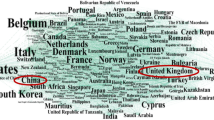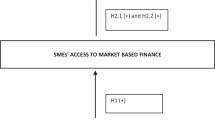Abstract
This paper discusses the role of multinational firms and double taxation treaties for corporate income taxation in open economies. We show that it is optimal for a small open economy to levy positive corporate income taxes if multinational firms are taxed according to the full taxation after deduction system or the foreign tax credit system. Positive corporate taxes also occur in the asymmetric case where some countries apply the exemption system and others apply the tax credit system. If all countries apply the exemption system, the optimal corporate income tax is zero. We also show that, under tax competition, corporate income taxes are not necessarily too low from the perspective of the economy as a whole. While the undertaxation result is confirmed for the case of the exemption system, tax rates may also be inefficiently high if the deduction or the credit systems are applied.
Similar content being viewed by others
References
Bond, E.W. and L. Samuelson. (1989). “Strategic Behaviour and the Rules for International Taxation of Capital. ” Economic Journal 99, 1099–1111.
Bucovetsky, S. and J. D. Wilson. (1991). “Tax Competition with Two Tax Instruments. ” Regional Science and Urban Economics 21, 333–350.
Chennells, L. and R. Griffith. (1997). Taxing Profits in a Changing World. London: Institute for Fiscal Studies.
Davies, R. B. (1999). “The OECD Model Tax Treaty: Tax Competition and Two-Way Capital Flows. ” Working Paper, University of Oregon.
Devereux, M. and H. Freeman. (1995). “The Impact of Tax on Foreign Direct Investment: Empirical Evidence and the Implications for Tax Integration Schemes. ” International Tax and Public Finance 2, 85–106.
Dickescheid, T. (2000). “Exemption vs. Credit Method: A Cooperative Welfare Analysis. ” Working Paper, University of Dortmund.
Edwards, J. and M. Keen. (1996). “Tax Competition and Leviathan. ” European Economic Review 40, 113–134.
Feldstein, M. and C. Horioka. (1980). “Domestic Savings and International Capital Flows. ” Economic Journal 90, 314–329.
Feldstein, M. and D. Hartman. (1979). “The Optimal Taxation of Foreign Source Investment Income. ” Quarterly Journal of Economics 93, 613–624.
Fuest, C. and B. Huber. (2000). “Labour and Capital Income Taxation, Fiscal Competition, and the Distributionm of Wealth. ” Journal of Public Economics 79, 71–91.
Fuest, C. and B. Huber. (2001). “Why do Countries Exempt Foreign Income of Multinational Firms from Corporate Taxation? The Role of Shareholder Taxes and Imputation Systems. ” Working Paper, University of Munich.
Gordon, R. H. (1992). “Can Capital Income Taxes Survive in Open Economies?” Journal of Finance 47, 1159–1180.
Gordon, R. H. and H. Varian. (1989). “Taxation of Asset Income in the Presence of a World Securities Market. ” Journal of International Economics 26, 205–226.
Gordon, R. H. and L. Bovenberg. (1996). “Why is Capital so Immobile Internationally? Possible Explanations and Implications for Capital Income Taxation. ” American Economic Review 86, 1057–1075.
Hamada, K. (1966). “Strategic Aspects of Taxation on Foreign Investment Income. ” Quarterly Journal of Economics 80, 361–375.
Haufler, A. (1999). “Prospects for Co-ordination of Corporate Taxation and the Taxation of Interest Income in the EU. ” Fiscal Studies 20, 133–153.
Huber, B. (1999). “Tax Competition and Tax Coordination in an Optimum Income Tax Model. ” Journal of Public Economics 71, 441–458.
Huizinga, H. and S. B. Nielsen. (1997). “Capital Income and Profit Taxation with Foreign Ownership of Firms. ” Journal of International Economics 42, 149–165.
Janeba, E. (1995). “Corporate Income Tax Competition, Double Taxation Treaties, and Foreign Direct Investment. ” Journal of Public Economics 56, 311–326.
Keen, M. and H. Piekkola. (1997). “Simple Rules for the Optimal Taxation of International Capital Income. ” Scandinavian Journal of Economics 99, 447–461.
Mintz, J. M. and H. Tulkens. (1990). “The OECD Convention: A “Model” for Corporate Tax Harmonization?” In R. Prud'homme (ed.), Public Finance with Several Levels of Government/Finances Publiques avec Plusieurs Niveaux de Gouvernement, Proceedings of the 46th Congress of the International Institute of Public Finance, Brussels, 298–314.
Mintz, J. M. and H. Tulkens. (1996). “Optimality Properties of Alternative Systems of Taxation of Foreign Capital Income. ” Journal of Public Economics 60, 373–399.
OECD. (1977). “Model Double Taxation Convention on Income and Capital. ” Report of the OECD Committee on Fiscal Affairs, Paris.
Ruding Report. (1992). “Report of the Committee of Independent Experts on Company Taxation. ” Brussels and Luxemburg: Commission of the European Communities.
Scharf, K. (2001). “International Capital Tax Evasion and the Foreign Tax Credit Puzzle. ” Canadian Journal of Economics 34, 465–480.
Zodrow, G. R. and P. Mieszkowski. (1986). “Pigou, Tiebout, Property Taxation, and the Underprovision of Local Public Goods. ” Journal of Urban Economics 19, 356–370.
Author information
Authors and Affiliations
Rights and permissions
About this article
Cite this article
Fuest, C., Huber, B. Why Capital Income Taxes Survive in Open Economies: The Role of Multinational Firms. International Tax and Public Finance 9, 567–589 (2002). https://doi.org/10.1023/A:1020969604309
Issue Date:
DOI: https://doi.org/10.1023/A:1020969604309




